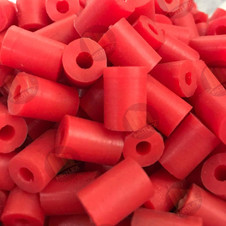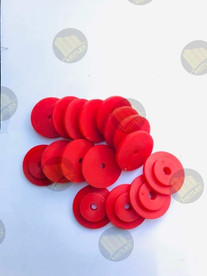Customized Silicone Rubber: A High-Quality Rubber Product
- MATLEX Rubber Philippines

- Feb 9, 2023
- 4 min read
Updated: Dec 3, 2024
Understanding Silicone Rubber

Silicone rubber is a versatile material known for its excellent temperature resistance, electrical insulation properties, and durability. It is widely used in a range of industries due to its exceptional characteristics, including flexibility, chemical inertness, and low toxicity. We leverage the benefits of silicone rubber to create customized solutions for high-quality rubber products. At Matlex Rubber Supplier Philippines, we specialize in providing excellent silicone rubber customization services, offering high-quality rubber products tailored to your needs. Our commitment to delivering exceptional quality and customized rubber solutions sets us apart as a trusted partner in the industry. Contact us today at (046) 886-7045, 0919-079-0031, 0906-410-7353, or email sales.matlexrubber@gmail.com or sales1.matlexrubber@gmail.com to discuss your requirements and experience the benefits of our customized rubber products.
The Benefits of Customized Silicone Rubber

Temperature Resistance
Silicone rubber exhibits remarkable thermal stability, making it suitable for applications that involve extreme temperatures. Whether your project requires heat resistance or cryogenic properties, our customized silicone rubber products can withstand the most demanding temperature conditions.
Electrical Insulation
Silicone rubber has excellent electrical insulation properties, making it ideal for applications where electrical conductivity must be minimized. Our customized silicone rubber solutions provide effective electrical insulation, ensuring safety and reliability in electrical and electronic systems.
Chemical Resistance
Silicone rubber offers resistance to a range of chemicals, including acids, bases, solvents, and oils. This chemical inertness allows our customized silicone rubber products to maintain their integrity and performance even in harsh chemical environments, providing long-lasting solutions for diverse industrial applications.
Flexibility and Elasticity
Customized silicone rubber products from Matlex Rubber Supplier Philippines are designed to provide superior flexibility and elasticity. This inherent flexibility enables our silicone rubber solutions to adapt to a range of shapes and contours, ensuring proper sealing, cushioning, and protection in critical applications.
Low Toxicity
Silicone rubber is widely recognized for its low toxicity and excellent biocompatibility, making it suitable for medical, pharmaceutical, and food applications. Our customized silicone rubber products adhere to strict safety and regulatory standards, providing peace of mind and reliability in sensitive environments.
Customized silicone rubber products from us offer a range of benefits for diverse applications. With excellent temperature resistance, electrical insulation, chemical resistance, flexibility, elasticity, and low toxicity, our customized silicone rubber solutions provide reliable and high-performance solutions for a range of industries. Experience the advantages of bespoke silicone rubber products that meet your specific needs and exceed your expectations.
Common Applications of Silicone Rubber
Silicone rubber is a versatile material with many applications due to its unique properties, such as high-temperature resistance, low-temperature flexibility, chemical resistance, electrical insulation, weather resistance, biocompatibility, and low toxicity.

Some of the standard applications of silicone rubber include:
Automotive
Silicone rubber is used in a range of automotive applications, including gaskets, seals, hoses, and electrical wiring.
Aerospace
Silicone rubber is used in aerospace applications for its high-temperature resistance and electrical insulation properties, including seals, gaskets, and electrical wiring.
Medical
Silicone rubber is widely used in the medical industry due to its biocompatibility, low toxicity, and ability to withstand sterilization. It is used in catheters, breathing tubes, and prosthetics.
Electrical and Electronics
Silicone rubber is used as an electrical insulator and is often used in high-voltage applications to protect against electrical shock and electrical interference.
Construction
Silicone rubber is used as a sealant and adhesive in construction applications.
Food and Beverage
Silicone rubber is used in the food and beverage industry due to its biocompatibility, low toxicity, and resistance to extreme temperatures and chemicals. It is used in baking mats and gaskets for food processing equipment.
Consumer Goods
Silicone rubber is used in a range of consumer goods, including kitchenware, toys, and personal care products.
Textiles
Silicone rubber is used as a finishing agent to add a soft, smooth, and waterproof finish to fabrics.
These are just a few examples of the many applications of silicone rubber. Its unique combination of properties makes it a highly versatile material that is used in a wide range of industries.
Why Choose Matlex Rubber Supplier?
Quality Assurance
At Matlex Rubber Supplier, we prioritize quality in our silicone rubber fabrication process. We source premium-grade silicone rubber materials and employ rigorous quality control measures to ensure that our customized products meet the highest standards of excellence and reliability.
Expertise and Experience
With years of experience in the rubber industry, our team of skilled engineers and technicians possesses deep expertise in silicone rubber fabrication. We stay updated with the latest advancements in silicone rubber technology, allowing us to provide innovative solutions tailored to your specific needs.
Customization Flexibility
We understand that every project is unique and are committed to delivering customized silicone rubber solutions that precisely match your requirements. From material selection and design to color, shape, and size, we offer flexibility in customization to meet your project's specifications and preferences.
Quick Turnaround Time
Time is of the essence in the business world, and we value your time. Our streamlined processes and efficient production capabilities enable us to provide quick turnaround times without compromising quality. We strive to meet your project deadlines and deliver your customized silicone rubber products promptly.
Excellent Customer Service
We prioritize customer satisfaction. We take the time to understand your needs, provide professional guidance, and offer prompt assistance. Our friendly and knowledgeable customer service team is always ready to address your inquiries and ensure a smooth and enjoyable customer experience.
Choose us for your silicone rubber needs because of our commitment to quality assurance, extensive expertise and experience in silicone rubber fabrication, customization flexibility to match your unique requirements, quick turnaround times without compromising on quality, and excellent customer service that ensures a smooth and enjoyable experience. Trust us to deliver high-quality customized silicone rubber solutions that meet the highest standards of excellence and reliability.
Matlex Rubber Supplier Philippines is your trusted partner for customized silicone rubber solutions. Contact us at (046) 886-7045, 0919-079-0031, 0906-410-7353, or email matlexrubber@gmail.com to discuss your requirements and benefit from our high-quality rubber fabrication expertise. Whether you need customized silicone rubber products for industrial, medical, electronics, or other applications, we are here to provide reliable solutions that meet your expectations. Experience our bespoke silicone rubber products' exceptional quality, durability, and performance today!






















Comments